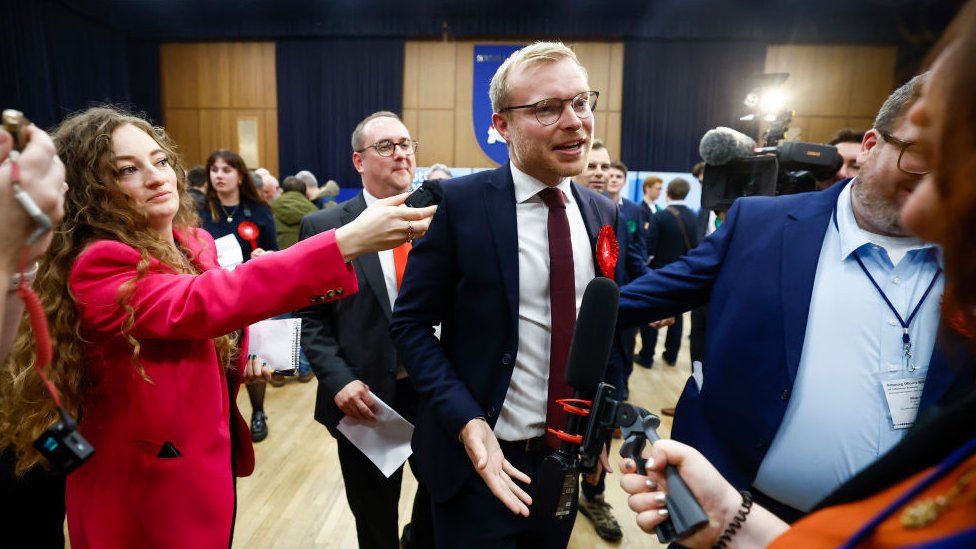ARTICLE AD BOX
 Image source, Getty Images
Image source, Getty Images
Michael Shanks' victory allows Labour to dream of a revival in Scotland
By Chris Mason
Political editor
This result transforms the Scottish political weather - and in so doing changes the forecasts some will make about the next general election.
Yes, there are limits to what can be read into any one by election; Labour's 17,845 votes in South Lanarkshire in a nation of 5.4 million people.
And remember, this was a by-election brought about in unusual circumstances - the previous MP's egregious breach of the Covid rules.
But, nonetheless, it is the scale of Labour's victory in Rutherglen and Hamilton West that is so, so eye-catching.
They won by a mile and with a massive swing of 20.4% from the SNP to Labour.
Swing is the term used to describe changes in party support.
Labour's leader in Scotland, Anas Sarwar, claimed Scotland will "lead the way and deliver a UK-wide Labour government".
At every general election since the Scottish independence referendum in 2014, Labour's representation at Westminster has been small, even tiny. And it still is.
The last time Labour won a general election, way back in 2005, the party won 41 seats in Scotland.
But they also won 41 seats in 2010 - a general election the party lost.
So doing very well in Scotland does not guarantee Labour success at Westminster.
But it is also true that the absence of success in Scotland for Labour makes winning a general election incredibly difficult.
Until this morning, the party had just one MP in Scotland. It now has two.
Image source, PA Media
Image caption,Sir Keir Starmer was a regular visitor to the constituency during the campaign
But this result suggests that could change and change big time at the next general election, and therefore potentially make Keir Starmer's path to Downing Street so much more navigable.
The Scottish National Party, the goliath of Scottish politics ever since the independence referendum, confronts three giant challenges.
It has been in power at Holyrood for ages, since 2007. Ageing affects us all, and it affects political parties.
The SNP's very reason for being - securing and then winning an independence referendum - looks a long way off, the party having run out of obvious routes to secure one in the short to medium term.
And then there is the ongoing police investigation into the SNP's finances, which has led to the arrest of former First Minister Nicola Sturgeon and her husband, Peter Murrell, who used to run the SNP.
Both were released without charge, pending further investigation.
Stephen Flynn, the SNP's leader at Westminster, described this as "very challenging internal circumstances" for his party. But he acknowledged to the BBC that "we've taken a bit of a kicking".
The Conservative Party, 13 years into a stint in office in Westminster, faces those same affects of political ageing - and has been in a long standing hole in the opinion polls.
Panda parity
In recent months, both of these factors have led to a more upbeat assessment of the Scottish political landscape by Labour folk.
There has been private talk within the party of possibly winning a dozen or more seats at the general election, maybe even 20.
But the scale of Labour's victory in this by election is considerably bigger than recent opinion polls have indicated.
It will leave some pondering if this is an indication that there might be a return to pre-independence referendum politics in Scotland - where Labour are the dominant party.
They are miles and miles away from that right now. As the BBC's Scotland Editor James Cook points out, Labour have merely established panda parity - there are as many Labour MPs in Scotland as there are black-and-white bears.
But this result will allow them to dream of many, many more Scottish MPs.
Some Scottish Labour figures now claim they are serious contenders in as many as 28 seats.
By-elections are often the mood makers of politics.
This thunderbolt of a result leaves Labour chipper; the SNP and the Conservatives gloomy.

 1 year ago
22
1 year ago
22








 English (US) ·
English (US) ·